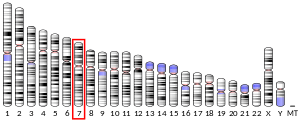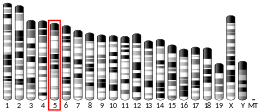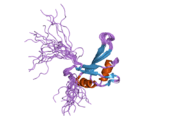EIF4H
Eukaryotic translation initiation factor 4H is a protein that in humans is encoded by the EIF4H gene.[5][6][7]
This gene encodes one of the translation initiation factors, which function to stimulate the initiation of protein synthesis at the level of mRNA utilization. This gene is deleted in Williams syndrome, a multisystem developmental disorder caused by the deletion of contiguous genes at 7q11.23. Alternative splicing of this gene generates 2 transcript variants.[7]
EIF4H appears analogous to drr-2 in C. elegans which regulates the mTOR pathway and affects longevity.[8]
References
- GRCh38: Ensembl release 89: ENSG00000106682 - Ensembl, May 2017
- GRCm38: Ensembl release 89: ENSMUSG00000040731 - Ensembl, May 2017
- "Human PubMed Reference:". National Center for Biotechnology Information, U.S. National Library of Medicine.
- "Mouse PubMed Reference:". National Center for Biotechnology Information, U.S. National Library of Medicine.
- Richter-Cook NJ, Dever TE, Hensold JO, Merrick WC (Apr 1998). "Purification and characterization of a new eukaryotic protein translation factor. Eukaryotic initiation factor 4H". J Biol Chem. 273 (13): 7579–87. doi:10.1074/jbc.273.13.7579. PMID 9516461.
- Doepker RC, Hsu WL, Saffran HA, Smiley JR (Apr 2004). "Herpes simplex virus virion host shutoff protein is stimulated by translation initiation factors eIF4B and eIF4H". J Virol. 78 (9): 4684–99. doi:10.1128/JVI.78.9.4684-4699.2004. PMC 387725. PMID 15078951.
- "Entrez Gene: EIF4H eukaryotic translation initiation factor 4H".
- "Early discovery may aid search for anti-aging drugs". 2010. Archived from the original on 2010-08-22. Retrieved 2010-08-22.
Further reading
- Nomura N, Miyajima N, Sazuka T, et al. (1995). "Prediction of the coding sequences of unidentified human genes. I. The coding sequences of 40 new genes (KIAA0001-KIAA0040) deduced by analysis of randomly sampled cDNA clones from human immature myeloid cell line KG-1". DNA Res. 1 (1): 27–35. doi:10.1093/dnares/1.1.27. PMID 7584026.
- Nomura N, Miyajima N, Sazuka T, et al. (1995). "Prediction of the coding sequences of unidentified human genes. I. The coding sequences of 40 new genes (KIAA0001-KIAA0040) deduced by analysis of randomly sampled cDNA clones from human immature myeloid cell line KG-1 (supplement)". DNA Res. 1 (1): 47–56. doi:10.1093/dnares/1.1.47. PMID 7584028.
- Osborne LR, Martindale D, Scherer SW, et al. (1997). "Identification of genes from a 500-kb region at 7q11.23 that is commonly deleted in Williams syndrome patients". Genomics. 36 (2): 328–36. doi:10.1006/geno.1996.0469. PMID 8812460.
- Richter NJ, Rogers GW, Hensold JO, Merrick WC (2000). "Further biochemical and kinetic characterization of human eukaryotic initiation factor 4H". J. Biol. Chem. 274 (50): 35415–24. doi:10.1074/jbc.274.50.35415. PMID 10585411.
- Martindale DW, Wilson MD, Wang D, et al. (2000). "Comparative genomic sequence analysis of the Williams syndrome region (LIMK1-RFC2) of human chromosome 7q11.23". Mamm. Genome. 11 (10): 890–8. doi:10.1007/s003350010166. PMID 11003705.
- Rogers GW, Richter NJ, Lima WF, Merrick WC (2001). "Modulation of the helicase activity of eIF4A by eIF4B, eIF4H, and eIF4F". J. Biol. Chem. 276 (33): 30914–22. doi:10.1074/jbc.M100157200. PMID 11418588.
- Strausberg RL, Feingold EA, Grouse LH, et al. (2003). "Generation and initial analysis of more than 15,000 full-length human and mouse cDNA sequences". Proc. Natl. Acad. Sci. U.S.A. 99 (26): 16899–903. doi:10.1073/pnas.242603899. PMC 139241. PMID 12477932.
- Gevaert K, Goethals M, Martens L, et al. (2004). "Exploring proteomes and analyzing protein processing by mass spectrometric identification of sorted N-terminal peptides". Nat. Biotechnol. 21 (5): 566–9. doi:10.1038/nbt810. PMID 12665801.
- Scherer SW, Cheung J, MacDonald JR, et al. (2003). "Human chromosome 7: DNA sequence and biology". Science. 300 (5620): 767–72. doi:10.1126/science.1083423. PMC 2882961. PMID 12690205.
- Hillier LW, Fulton RS, Fulton LA, et al. (2003). "The DNA sequence of human chromosome 7". Nature. 424 (6945): 157–64. doi:10.1038/nature01782. PMID 12853948.
- Gerhard DS, Wagner L, Feingold EA, et al. (2004). "The status, quality, and expansion of the NIH full-length cDNA project: the Mammalian Gene Collection (MGC)". Genome Res. 14 (10B): 2121–7. doi:10.1101/gr.2596504. PMC 528928. PMID 15489334.
- Rush J, Moritz A, Lee KA, et al. (2005). "Immunoaffinity profiling of tyrosine phosphorylation in cancer cells". Nat. Biotechnol. 23 (1): 94–101. doi:10.1038/nbt1046. PMID 15592455.
- Feng P, Everly DN, Read GS (2005). "mRNA decay during herpes simplex virus (HSV) infections: protein-protein interactions involving the HSV virion host shutoff protein and translation factors eIF4H and eIF4A". J. Virol. 79 (15): 9651–64. doi:10.1128/JVI.79.15.9651-9664.2005. PMC 1181552. PMID 16014927.
- Tao WA, Wollscheid B, O'Brien R, et al. (2005). "Quantitative phosphoproteome analysis using a dendrimer conjugation chemistry and tandem mass spectrometry". Nat. Methods. 2 (8): 591–8. doi:10.1038/nmeth776. PMID 16094384.
- Rual JF, Venkatesan K, Hao T, et al. (2005). "Towards a proteome-scale map of the human protein-protein interaction network". Nature. 437 (7062): 1173–8. doi:10.1038/nature04209. PMID 16189514.
External links
- Overview of all the structural information available in the PDB for UniProt: Q9WUK2 (Mouse Eukaryotic translation initiation factor 4H) at the PDBe-KB.
This article is issued from Wikipedia. The text is licensed under Creative Commons - Attribution - Sharealike. Additional terms may apply for the media files.





